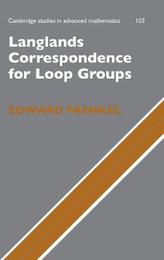
|
Langlands Correspondence for Loop Groups
Hardback
Main Details
| Title |
Langlands Correspondence for Loop Groups
|
| Authors and Contributors |
By (author) Edward Frenkel
|
| Series | Cambridge Studies in Advanced Mathematics |
|---|
| Physical Properties |
| Format:Hardback | | Pages:396 | | Dimensions(mm): Height 235,Width 160 |
|
| ISBN/Barcode |
9780521854436
|
| Classifications | Dewey:512.2 |
|---|
| Audience | | Professional & Vocational | |
|---|
| Illustrations |
1 Tables, unspecified; 3 Line drawings, unspecified
|
|
Publishing Details |
| Publisher |
Cambridge University Press
|
| Imprint |
Cambridge University Press
|
| Publication Date |
28 June 2007 |
| Publication Country |
United Kingdom
|
Description
The Langlands Program was conceived initially as a bridge between Number Theory and Automorphic Representations, and has now expanded into such areas as Geometry and Quantum Field Theory, tying together seemingly unrelated disciplines into a web of tantalizing conjectures. A new chapter to this grand project is provided in this book. It develops the geometric Langlands Correspondence for Loop Groups, a new approach, from a unique perspective offered by affine Kac-Moody algebras. The theory offers fresh insights into the world of Langlands dualities, with many applications to Representation Theory of Infinite-dimensional Algebras, and Quantum Field Theory. This accessible text builds the theory from scratch, with all necessary concepts defined and the essential results proved along the way. Based on courses taught at Berkeley, the book provides many open problems which could form the basis for future research, and is accessible to advanced undergraduate students and beginning graduate students.
Author Biography
Edward Frenkel is Professor of Mathematics at the University of California, Berkeley
Reviews'This book is well written and will give especially the interested student, an excellent basis in this rapidly developing area of mathematics. For those beyond the level of student it also provides very useful text to follow, and perhaps to participate, in these developments.' Samuel James Patterson, Zentralblatt MATH
|